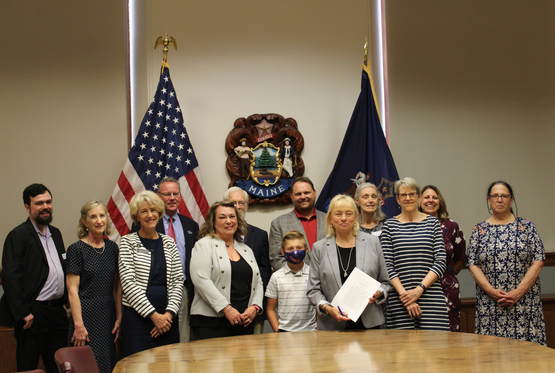On August 30, 2021, MeBIC and the American Business Immigration Coalition (ABIC) were joined by voices from Maine’s business and higher education communities to call on Maine’s Congressional delegation to support inclusion of a path to permanent residency for undocumented members of our communities in the FY 2022 budget reconciliation package.
St. Joseph’s College of Maine’s President James Dlugos, Ph.D., who is also the President of the Maine Association of Independent Colleges (MICA), and James Herbert, Ph.D., President of the University of New England and former member of the Governor’s Economic Recovery Committee released a letter from MICA, calling on Maine’s Senators to create a path to residency for Dreamers, undocumented immigrants who came to the U.S. as children, either by passing the Dream Act of 2021, or by supporting inclusion of legalization for Dreamers in the budget reconciliation bill currently being negotiated in Congress. The two university presidents stressed the importance of robust immigration to all of Maine’s colleges, universities, and to Maine’s economic and demographic future.
They were joined by David Barber, of Tyson /Barber Foods, and Adele Ngoy, an immigrant entrepreneur, fashion designer and owner of Adele Masengo Designs, and of Antoine’s Formal Wear and Tailor Shop, as well as the founder of the nonprofit Women United Around the World, which teaches new immigrants to sew so they can support themselves in Maine’s growing textile manufacturing sector. Along with MeBIC and ABIC, they called for Maine’s delegation to support inclusion of provisions to legalize Dreamers, farmworker and other essential workers, and TPS holders via the reconciliation process.
The House of Representatives has already passed bipartisan legislation to this end, but the Senate has failed to muster the bipartisan support needed to pass their counterpart bills. The higher education and business voices made it clear, inaction is not an option. Congress must pass these reforms through the budget reconciliation process if that is the only path forward.
You can see coverage of the event here:
Maine Public: Business, Higher Education Leaders Call for Pathway to Citizenship for Undocumented Immigrants
WGME: Maine Business Leaders, Schools, Call to Open State to More Immigrants
Business, higher education leaders call for pathway to citizenship for undocumented immigrants
https://newszf.com/business-university-leaders-are-calling-for-a-path-to-citizenship-for-illegal-immigrants/
https://theultramods.com/articles/business-higher-education-leaders-are-demanding-a-path-to-citizenship-for-undocumented-immigrants/


